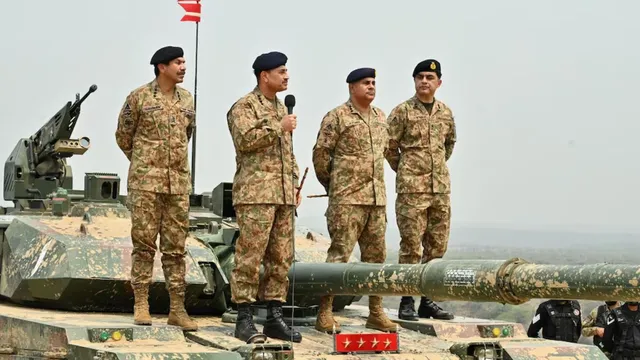- By Harsh V Pant
- Wed, 20 Aug 2025 11:44 AM (IST)
- Source:JNM
Pakistan Army Field Marshal Gen Asim Munir exacerbated the issue of nuclear weapons in the subcontinent during his trip to the United States. He underscored the idea of mutually assured destruction and threatened strikes against India’s existing and upcoming critical infrastructure in the near future. This latest act of theatrics is worth examining in the new strategic environment defined by Operation Sindoor, a renewed initiative by New Delhi against Islamabad's decades-old sponsorship of terrorism. The Pakistan Army aims to secure its support base in both the domestic and international community by trying to delegitimise and constrain India’s conventional military options against Pakistan's misadventurous policy in future.
Gen Munir’s remarks on nuclear signalling are both rhetorical and critical for four main reasons. First, Pakistan, primarily its elites and the military, has drawn both its existence and policy initiatives from its sentiments against India-based existential security threats. Pakistan military, with its army as the most dominant wing, leads the narrative within the country and abroad. Hence, Gen Munir’s words are crucial in shaping the discourse within the domestic constituency to reestablish the image of the military as an institution and its readiness to safeguard the sovereignty of the state.
Second, as a senior-most official in the Pakistan Army, Munir’s speech on a foreign soil, especially the US, is a move to reemphasise the threat of asymmetric escalation, which is an inherent part of Pakistani nuclear doctrine. The underlying motive is intertwined with Munir’s religious doctrinal leanings to perceive India’s image as a Hindutva ideology-based state threatening Pakistan. In this regard, the emphasis on nuclear weapons is to recalibrate and restore the element of strategic stability vis-a-vis India. Islamabad, since its overt nuclearisation in 1998, has been attempting to impose structural conditions on New Delhi to push its sub-conventional warfare marked by cost infliction through the sponsorship of terrorism. India, in response, evident through its conventional military response, has been adopting a more risk-acceptance approach to restore deterrence and reestablish new contours of engagement in the nuclear environment. Pakistan is making all possible attempts to overplay the (in)stability element to pressurise New Delhi. As a result, it establishes the narrative that if India undertakes any Op Sindoor 2.0-like military initiative in the future, Pakistan will be compelled to use (tactical) nuclear weapons. However, risking nuclear escalation remains a challenge for Pakistan given the certainty of Indian retaliation.
Third, Munir’s statements aim to reinforce Pakistan’s conception of the idea of ‘mutual vulnerability’ and hence a denial of space for a conventional level response by India. This construct of mutual vulnerability was already shattered by the Indian Army’s evolving strategy, demonstrated most recently by Operation Sindoor. In such a scenario, the constraints of vulnerability in the conventional domain at the lower rung of the escalation ladder and the maintenance of stability have fallen more on Pakistan.
Fourth, the Pakistan Army, as the guardian of its ideological state, has adopted an asymmetric nuclear posture against India’s superiority in the conventional domain of strategy. Pakistan holds a full-spectrum deterrence posture, including tactical nuclear weapons for employment, providing a lower threshold against India’s aggression. However, India has managed to challenge this imposition through its response against terrorist attacks in the form of Uri surgical strikes, Balakot air strikes, and the latest Operation Sindoor. Munir’s threats against India and the plausibility of mutually assured destruction are meant to bring in a third-party in the India-Pakistan nuclear dyad. His stress on nuclear dangers is aimed at roping in the international community, particularly the US, to intervene as a structural constraint against India’s response and deterrence policy. This catalytic nuclear posture could be seen as an effort to develop a safety valve for Islamabad against India’s redefined approach of “any attack on Indian soil will be considered as an act of war”.
Deterrence starts and ends within the cognitive cum psychological domain of strategy. Pakistan’s historical track record to exacerbate the nuclear element against India and to court the attention of the international community only validates the French novelist Jean-Baptiste Alphonse Karr's adage: the more it changes, the more it remains the same. Pakistan maintains a deliberate element of ambiguity, flirting with first use, but its operationalisation is muddled by a paradox that casts nuclear weapons simultaneously as a first-use option and a last resort in itself. India has leveraged this paradox to restore deterrence in the Balakot and Op Sindoor episodes. Hence, Field Marshal Munir’s words are a part of rhetoric emanating out of exasperation owing to Pakistan’s overdeterministic reliance on nuclear posture and his quest to restore his domestic constituency. To this end, there is a likelihood of the development of new capabilities by Pakistan against India’s ‘new normal’ post Op Sindoor and growing capabilities as a rationale. The latest US’ intelligence estimates predict that Pakistan is developing an ICBM capability to both match and challenge India’s growing base of capabilities. China may play the invisible hand to support Pakistan, given their historical cooperation in nuclear proliferation and acquisition of missile technology. The end goal is to deny India the initiative to establish a credible deterrence vis-a-vis Pakistan in the conventional-nuclear spectrum.
Against these developments, New Delhi must not shy away from amassing both nuclear and strategic non-nuclear capabilities as part of its growing arsenal and overall base of capabilities. Indian statesmen and policymakers should counter the rhetoric, as it otherwise helps Pakistan enhance its catalytic nuclear posture by bringing in the US as a structural factor in the India-Pakistan nuclear dyad. Op Sindoor has brought a new learning for New Delhi marked by a political will to support risk acceptance to inflict cost against any misadventure from Pakistan. India needs to delegitimise any such effort by Pakistan in the short to long term to reinforce stability and security beyond overreliance on nuclear weapons.
(The writer is the Vice President at the Observer Research Foundation. Views expressed are personal.)

